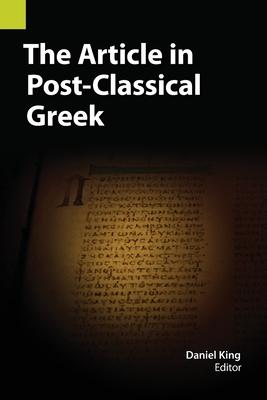For New Testament biblical scholars, this book constitutes a vital summary of contemporary, theoretically-sound interpretations of the linguistic functions of the Post-Classical (Koine) Greek article in a way that will inform exegesis of the text, especially in the fi eld of larger discourse units. There is also signifi cant payoff for the as-yet signifi cantly under-researched fi eld of Koine linguistics. The essays included in this volume are written by notable experts, off ering contributions to the linguistic analysis of the Post-Classical Greek language. While there remains no comprehensive treatment of the grammar of the Post-Classical dialects, individual elements of that grammar continue to be fruitfully explored. The collection presented here off ers interpretations of the functions and grammar of the Greek article (ὁ, ἡ, τό) from a variety of perspectives, including generative grammar and discourse analysis, along with studies that make use of text-critical and diachronic data. Together, these supply readers of Greek with a thorough understanding of the functions of the article and constitute a starting point for further research efforts.

The Article in Post-Classical Greek
For New Testament biblical scholars, this book constitutes a vital summary of contemporary, theoretically-sound interpretations of the linguistic functions of the Post-Classical (Koine) Greek article in a way that will inform exegesis of the text, especially in the fi eld of larger discourse units. There is also signifi cant payoff for the as-yet signifi cantly under-researched fi eld of Koine linguistics. The essays included in this volume are written by notable experts, off ering contributions to the linguistic analysis of the Post-Classical Greek language. While there remains no comprehensive treatment of the grammar of the Post-Classical dialects, individual elements of that grammar continue to be fruitfully explored. The collection presented here off ers interpretations of the functions and grammar of the Greek article (ὁ, ἡ, τό) from a variety of perspectives, including generative grammar and discourse analysis, along with studies that make use of text-critical and diachronic data. Together, these supply readers of Greek with a thorough understanding of the functions of the article and constitute a starting point for further research efforts.